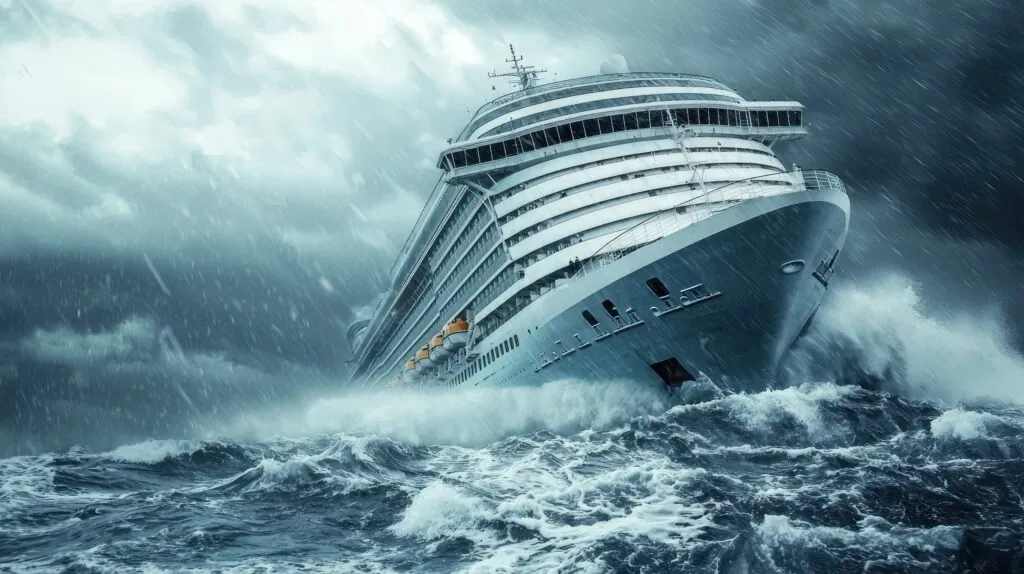Can Cruise Ship Crew Sue Employers in U.S. Courts?
Working aboard a cruise ship presents unique dangers. Crew members face long shifts, strenuous tasks, and exposure to hazardous conditions—all while being far from home and family. If you’re injured on the job, you may not know where to turn or whether you have any legal rights.
Many cruise lines rely on foreign contracts, confusing legal language, and intimidation tactics to discourage injured workers from seeking justice. But the truth is this: you may be eligible to file a lawsuit in the United States, even if you’re not a U.S. citizen.
At The Cruise Injury Law Firm, we are committed to helping injured crew members from around the world take legal action against negligent employers and recover the compensation they deserve under U.S. maritime law.

Your Legal Rights Under the Jones Act and U.S. Maritime Law
What Is the Jones Act?
The Jones Act, part of the Merchant Marine Act of 1920, allows maritime workers who qualify as “seamen” to sue their employers for negligence when they are injured on the job. This law is one of the most powerful legal tools available to cruise ship workers.
Who Is Protected?
To qualify as a seaman under the Jones Act, you must:
- Work aboard a vessel in navigation
- Spend at least 30% of your time on that vessel
- Contribute to the vessel’s mission or function
Most full-time cruise ship crew members meet these criteria. Even if you’re a foreign national, you can still be covered under this U.S. law.
What Laws May Apply?
In addition to the Jones Act, you may be protected by:
- General Maritime Law, which includes claims for unseaworthiness
- Maintenance and Cure, which requires your employer to pay medical bills and living expenses until you reach maximum recovery
These protections are specifically designed to help maritime workers recover physically and financially after injury.
Can You Sue a Cruise Line Employer in the U.S.?
Cruise Lines Try to Block Lawsuits—We Help You Fight Back
Many crew members believe that they can’t sue their employer in the U.S. because their ship is registered in another country or their contract mentions foreign arbitration. In reality, U.S. courts frequently accept jurisdiction over cruise injury claims.
When U.S. Jurisdiction Applies
You may be able to sue your employer in the U.S. if:
- The cruise line is based or incorporated in the United States
- The ship operates out of U.S. ports
- The injury occurred in or near U.S. waters
- The employer’s negligent decisions were made in the U.S.
- The contract refers to U.S. maritime law
Our firm has successfully challenged foreign arbitration clauses and brought cases to U.S. courts even when cruise lines tried to block them. We will review your contract and employment history to determine your eligibility to file in the U.S.
How to File a Maritime Injury Lawsuit as a Crew Member
1. Start With Documentation
If you’re injured at sea, your first priority is to seek medical care. But you should also report the incident to your supervisor and make sure a written injury report is created. Always request copies of all documents and medical evaluations.
2. Avoid Signing Away Your Rights
Cruise lines often pressure injured workers to sign post-incident statements or settlement forms. These documents can limit your rights or waive your ability to sue. Never sign anything without speaking to an experienced maritime attorney.
3. Let Us Handle the Legal Process
At The Cruise Injury Law Firm, we manage every part of your case:
- Gathering evidence
- Reviewing contracts
- Filing the lawsuit in the correct jurisdiction
- Working with doctors and maritime experts
You don’t have to travel to the United States to file a claim. We work with clients from around the world using secure communication tools and remote consultations.
Compensation for Injured Cruise Ship Workers
What You May Be Entitled To
A work-related injury aboard a cruise ship can have life-changing consequences. As a crew member, your physical ability is your livelihood. When that’s taken away, so is your income—and potentially your future career.
If your employer was negligent or failed to provide a safe work environment, you may be entitled to substantial compensation, including:
- Medical expenses for emergency care, hospitalization, surgery, and ongoing treatment
- Lost wages and future loss of income
- Pain and suffering, including emotional distress and mental trauma
- Vocational rehabilitation if you can’t return to your previous job
- Maintenance and cure for daily expenses and medical bills during recovery
- Punitive damages if your employer acted recklessly or with gross negligence
We fight for the full value of your case, including future losses. Do not accept an insurance or cruise line settlement without understanding what your case is truly worth.
Common Injuries Sustained by Cruise Ship Crew Members
Dangerous Conditions Create High Risk
Cruise ship workers are exposed to slippery surfaces, malfunctioning equipment, physical strain, and long hours—all of which contribute to a wide range of serious injuries.
Frequent Injuries Include:
- Slip and fall injuries on wet decks or stairwells
- Back injuries from lifting heavy items
- Repetitive stress injuries from cleaning or food service tasks
- Head trauma from falling objects or ship movement
- Crush injuries or amputations from mechanical malfunctions
- Burns from kitchen accidents or electrical issues
- Mental health issues, including PTSD and depression after injury or abuse
- Assault-related injuries, including those from physical or sexual violence by coworkers or passengers
If you suffered any of these injuries while performing your job duties, you may have a legal case. We partner with medical experts to document your injury and demonstrate how it affects your ability to work and live.
Challenges Faced by Foreign Crew Members
Don’t Let Language or Contracts Intimidate You
The majority of cruise ship crew members are hired from countries outside the United States. Cruise lines often use this to their advantage, offering contracts governed by foreign laws or containing arbitration clauses that seem to deny access to U.S. courts.
You May Still Be Protected Under U.S. Law
U.S. courts have frequently ruled that maritime workers can bring claims in the United States when cruise lines have strong U.S. connections. Our firm knows how to challenge arbitration and jurisdiction clauses—and we have done so successfully for crew members from the Philippines, India, Central and South America, the Caribbean, and Eastern Europe.
We are fully equipped to communicate with you in your native language, explain your legal rights, and represent you from wherever you are in the world.
Frequently Asked Questions
Can I sue my cruise line employer if I signed a contract in another country?
Yes, you may still be able to sue your cruise line employer in a U.S. court even if your employment contract was signed in another country. U.S. courts often override foreign arbitration clauses or jurisdictional language in contracts, particularly when the cruise line is headquartered or operates in the United States. If your injury occurred while working aboard a vessel that sails in or out of U.S. ports, you may have standing to bring your case under U.S. maritime law. Every contract is different, but our attorneys are highly experienced in evaluating these agreements and determining whether you can sue in American courts.
What kind of compensation can I receive for my injury?
If you were injured while working as a cruise ship crew member, you may be entitled to a wide range of compensation under the Jones Act and general maritime law. This can include payment for medical bills, surgeries, rehabilitation, and ongoing treatment. You may also recover lost wages and compensation for future loss of income if your injury affects your ability to work. Pain and suffering damages are also available in many cases. If your injury was caused by serious employer negligence, you may qualify for punitive damages. Additionally, under the doctrine of maintenance and cure, your employer is obligated to cover your daily living expenses and medical care until you reach maximum medical improvement.
Do I need to be a U.S. citizen to file a lawsuit under the Jones Act?
No, U.S. citizenship is not required to file a claim under the Jones Act or related maritime laws. What matters is your role as a seaman and whether your work was performed aboard a qualifying vessel in navigable waters. Foreign nationals who meet the criteria may file lawsuits in U.S. courts if the cruise line operates out of the United States or has substantial business connections here. Our firm regularly represents international crew members and has successfully helped foreign workers win compensation in American courts.
How long do I have to file my claim?
Under U.S. maritime law, the general statute of limitations for a personal injury claim is three years from the date of the injury. However, depending on the specific facts of your case, the applicable timeline may vary. Employment contracts sometimes contain shorter deadlines, and certain jurisdictions or claims types may require quicker action. To protect your legal rights, it is essential to speak with an attorney as soon as possible after your injury. Waiting too long could result in your claim being denied due to time restrictions.
What should I do immediately after I am injured on a cruise ship?
You should report your injury to your supervisor right away and make sure a formal incident report is created. Request a copy of the report for your records. Seek medical attention, whether onboard or at a port clinic, and keep detailed documentation of your diagnosis, treatment, and expenses. If you can, take photos of the scene and collect the names of any coworkers who witnessed the event. Do not sign any documents provided by the cruise line without speaking to a maritime injury lawyer. These forms are sometimes used to waive your rights or settle your claim prematurely. The most important step is to contact an experienced attorney who can help you understand your rights and protect your ability to recover compensation.
Contact The Cruise Injury Law Firm Today
If you’ve been injured while working on a cruise ship, you may feel isolated, overwhelmed, and unsure of what to do next. But you are not alone—and you do have legal rights.
The Cruise Injury Law Firm is here to help. We focus exclusively on cases involving injured cruise ship crew members. Our attorneys understand the unique challenges you face and have decades of combined experience fighting for seafarers just like you.
We work with crew members around the world and offer free, confidential consultations. You pay nothing unless we win your case.
Contact us today to speak with a maritime attorney. Let us help you take the next step toward justice and financial recovery.






